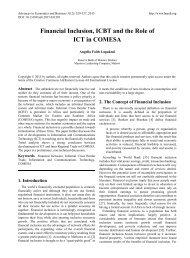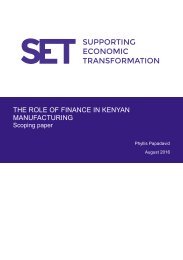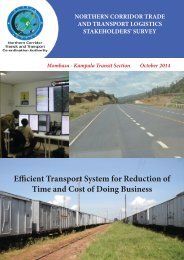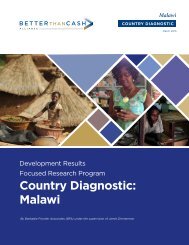FD
gvti301SEaf
gvti301SEaf
Create successful ePaper yourself
Turn your PDF publications into a flip-book with our unique Google optimized e-Paper software.
“There’s nothing in the current<br />
technologies preventing instant<br />
settlement.”<br />
ally buy insurance to protect against liability originating from<br />
an unexpected claim on the property they are buying—or<br />
the process for buying, registering, and paying taxes for a<br />
car. A blockchain could provide digital, unforgeable proof<br />
of ownership along with a complete record of the chain of<br />
possession. There is also substantial excitement about smart,<br />
self-executing contracts—for instance, travel insurance that<br />
pays automatically if a flight is cancelled, or a car loan that<br />
disables the ignition if payments are missed. Blockchain technology<br />
also powers an alternative to bitcoin called Ethereum<br />
(with a currency worth about $800 million), which has lately<br />
been attracting some mainstream attention. Unlike bitcoin,its<br />
paternity is known: Vitalik Buterin, a 22-year-old Russian-<br />
Canadian college dropout.<br />
Jerry Cuomo, IBM’s vice president for blockchain technologies,<br />
also sees potential applications of purpose-built private<br />
blockchains to improve transparency through compliance and<br />
auditing, in sharp contrast to bitcoin’s reputation as secretive<br />
and anonymous. “Bitcoin decided to be anonymous by design,”<br />
he says. However, “it’s perfectly possible to have a blockchain<br />
with different levels of access, in which participants don’t see<br />
what others are doing, but auditors and regulators come in at a<br />
higher level and see everything,” he explains.<br />
Although much of the experimentation with blockchain<br />
technology is occurring in the start-up world, IBM is one of<br />
a number of big businesses dipping a toe into this water. Last<br />
December, it joined the Linux Foundation to disseminate<br />
blockchain technology with open source software (meaning<br />
any programmer can work on it, as opposed to proprietary<br />
systems like Windows). Large banks such as JPMorgan<br />
Chase & Co. and technology companies like Cisco and Intel<br />
are collaborating on the initiative. In February, the Tokyo<br />
Stock Exchange joined IBM to test blockchain use in recording<br />
trades in low-transaction markets, and the Australian<br />
Stock Exchange has asked Digital Asset Holdings, a start-up,<br />
to develop distributed ledger technology for clearing and<br />
settlement. A consortium of 42 global banks is working with<br />
a new company called R3 to develop distributed ledger standardized<br />
technologies for the financial industry.<br />
Setting standards will be crucial here. It is typical of a new<br />
innovation cycle that different companies come up with<br />
different ways to do something, leading to a patchwork of<br />
technological approaches. Some worry that this could undo<br />
years of effort to integrate the financial industry globally. For<br />
example, under the Single Euro Payments Area (SEPA) initiative,<br />
it took European authorities 12 years from the launch<br />
of euro notes and coins in 2002 to integrate technological<br />
platforms and business procedures to make cross-border<br />
payments among the 35 participating countries as simple and<br />
inexpensive as a domestic transfer.<br />
As the ECB’s director general of market infrastructure and<br />
payments, Marc Bayle oversees SEPA and other continental<br />
integration initiatives, such as TARGET2, the euro area cash<br />
payment settlement system, and T2S, its equivalent for securities.<br />
He follows blockchain developments with interest, but<br />
is not impressed by some of the promises, like shorter settlement<br />
times. “There’s nothing in the current technologies<br />
preventing instant settlement. The problem is the structure<br />
of markets. If a fund manager in Miami wants to invest in<br />
Frankfurt, there will be many legal, operational, tax, and<br />
financial considerations to be taken into account, and they<br />
might prefer to work with intermediaries providing such<br />
expertise in a cross-border context between the United States<br />
and the EU/Germany,” Bayle says.<br />
Useful in central banks?<br />
He does not rule out the possibility that blockchain or similar<br />
distributed ledger technologies might evolve to become useful<br />
in central banks, despite their current limitations and the conceptual<br />
tension between distributed and central ledgers. While<br />
the use of blockchain to replace the ECB’s main settlement<br />
systems is not really envisioned now, it is being considered in<br />
certain niches to foster secondary markets for more exotic securities.<br />
“We have to see whether this technology can be useful<br />
for us, if it can help lowering costs and having more resilient<br />
systems. But also, we have to think how it affects financial intermediation,<br />
the role of banks and other market participants,<br />
as well as our capacity as regulators,” Bayle adds. Some are asking<br />
whether bitcoin and other blockchain applications could<br />
eventually undermine monetary policy and financial stability—but<br />
the consensus is that there is no immediate risk.<br />
It is probably too early to say whether blockchain is “the<br />
next Internet” or just an incremental evolution. Silicon Valley<br />
is paved with overhyped ideas that later proved unviable<br />
and with revolutionary companies that disappeared in a few<br />
years, but still in some cases had some impact. Andreessen’s<br />
Netscape Web browser was acquired by AOL in 1999 for over<br />
$4 billion. AOL itself, today a ghost of its lavish previous self,<br />
was acquired for about the same amount in 2015 by Verizon.<br />
It’s not impossible to think that bitcoin or other blockchain<br />
technology could implode because of a still unknown design<br />
flaw or the work of a, well, disruptive hacker.<br />
The blockchain game is only beginning. As Bill Gates once<br />
put it: “We always overestimate the change that will occur in<br />
the next two years and underestimate the change that will<br />
occur in the next ten.” ■<br />
Andreas Adriano is a Senior Communications Officer in the<br />
IMF’s Communications Department, and Hunter Monroe<br />
is a Senior Economist in the IMF’s Monetary and Capital<br />
Markets Department.<br />
Finance & Development June 2016 47














